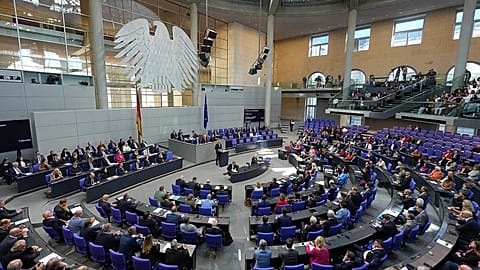Germany’s family-owned companies’ lobby has confirmed it is “saying goodbye to firewalls” against the far-right AfD as the party surges in national polling.
Germany's Family Business Association, which represents the interests of companies ranging from medium-sized enterprises to giants like BMW and Merck, has lifted the "firewall" that existed around any form of cooperation with the far-right Alternative for Germany (AfD) party.
 ADVERTISEMENT
ADVERTISEMENT
 ADVERTISEMENT
ADVERTISEMENT
A scandal broke out after it was revealed that the group had invited representatives of the AfD to a parliamentary evening event with members of other parties, held in October on premises owned by the Deutsche Bank.
On Monday, representatives of the group spoke to German media and confirmed that the firewall — a pledge by German parties, companies, and other societal actors to effectively shut out the AfD due to their unconstitutional and inflammatory activities — had failed.
Albrecht von der Hagen, managing director of the Family Business Association, told The Pioneer paper: "The firewall against the AfD... has achieved nothing... we are saying goodbye to firewalls".
Leif-Erik Holm, the economic policy spokesperson for the AfD's parliamentary caucus, confirmed that he was one of the attendees of the event in October.
This comes as the AfD has reached a 27% favourability rating nationwide in Germany.
The Family Business Association is a lobby group that has combined the promotion of standard business policies with social issues or thorny political topics. These include campaigns against collective bargaining agreements, against climate-friendly business policies, and for lenient inheritance tax policies.
In his statements to The Pioneer, von der Hagen stopped short of voicing support for the AfD's socially conservative views on families, individual rights, and immigrants, calling them "a sheer catastrophe" — although questions could arise as to whether merely inviting the AfD is seen as supportive of their causes.
The business association comprises around 6,500 family-run firms from Germany, including large corporations such as BMW and Oetker. Membership requires a minimum of ten employees and an annual turnover of at least €1 million.
The recent developments have led to concerns in Germany that business associations could be partially rethinking their approach to the AfD.
"Essentially, it's about interpreting what the firewall against the AfD actually is and what its purpose is," association president Marie-Christine Ostermann told Handelsblatt media.
"For us, the firewall was a total isolation of the AfD," which went so far "that we categorically refused to invite AfD members of parliament," Ostermann added.
"We lifted this kind of contact ban at the last parliamentary evening at the federal level — this type of firewall has never existed in our state-level region," she claimed.
Nevertheless, the association "absolutely does not want to see the AfD as a coalition partner in any government," she emphasised.
Deutsche Bank reacts
On Monday, Deutsche Bank cancelled its existing rental agreement with the Family Business Association following the news of the AfD being present at events being organised in their facilities, as reported by several news outlets including the Handelsblatt.
Deutsche Bahn, Siemens, Miele, Oetker, Stihl and Vorwerk have run pro-democracy or “no to AfD” style campaigns such as the "We Stand for Values" push ahead of the German federal elections this year, where they claimed that AfD positions are in conflict with their values and staffing needs.
On 2 May, the German Office for the Protection of the Constitution classified AfD as a confirmed right-wing extremist organisation based on information they had received from domestic intelligence bodies, after initially deeming it a "suspected" case.
Its assessments carry significant political and legal weight — once a group is classified as extremist, state institutions and private actors often treat it as a potential security risk, shaping everything from surveillance powers to how banks and companies engage with it.

















